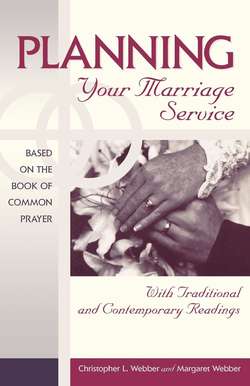Читать книгу Planning Your Marriage Service - Margaret Webber - Страница 14
На сайте Литреса книга снята с продажи.
E. The Ministry of the Word (p. 426)
ОглавлениеThis is the second major phase of the ceremony. The first stage consists of public statements of the meaning of marriage and your readiness to make the marriage commitment. Now, in the second stage, we hear the teaching of the Bible (and, perhaps, wisdom from other sources) concerning marriage. The choices you make here may take the most time just because there are so many possibilities. Here especially you have the opportunity to make choices that reflect your own love for each other and your understanding of God's gift of love to you. As you read the Bible and make your selections, bear in mind the questions asked in the Introduction: consider God's love for you, your love for each other, and the church, families, and communities that support you with their love.
The Bible is the primary resource in choosing readings since it is God's word to us about love. Love has to do with choosing and giving. We know this from our own experience, but that experience needs to be shaped and guided by the centuries of Jewish and Christian experience and by the life of Jesus, the supreme example of self-giving love. The following pages will suggest various appropriate readings and will comment on their value. You are not limited to these readings and should feel free to consider others that have special meaning for you.
It is also possible, with the consent of the priest, to choose readings from non-biblical sources. But choose carefully: many familiar passages about love are inadequate expressions of Christian love. They are self-centered rather than self-giving and focus too much on the romantic and emotional aspects of love. Remember also that poetry often packs too much thought into too few words to be understood easily on first hearing. Shakespeare's Sonnet 116, for example, says some very good things but requires more careful study than is possible in the midst of a church service. The readings should express the understanding that our love and joy is a gift and has a purpose larger than our own happiness.
Think of this section of the service as made up of alternating layers of readings and hymns or psalms: after each reading it is useful to have a psalm or hymn so that there is time to think about it before the next begins. There are two main options:
1) If the service includes a celebration of the eucharist, there must be at least two readings, and one of these readings must be from the gospels. One or two additional readings can be chosen from the Old Testament or the other books of the New Testament, or, with the consent of the priest, from a non-biblical source. Each reading can be followed by a hymn or psalm. Here are some of the patterns you could follow:
a. First Reading:_______________________
(Psalm or hymn: ___________________)
Second Reading:______________________
(Psalm or hymn: ____________________)
Gospel Reading:______________________
b. First Reading:_______________________
(Psalm or hymn: _____________________)
Gospel Reading:______________________
2) If the service does not include a celebration of the eucharist, there needs to be at least one reading from the Bible, but you can choose one or two additional readings if you wish. The other readings, with the consent of the priest, could be chosen from a non-biblical source. Each reading can be followed by a hymn or psalm.
c.(First Reading: _____________________)
(Psalm or hymn: _________________)
(Second Reading: ____________________)
(Psalm or hymn: _________________)
Bible Reading: _______________________
NOTE: It is good to involve family members and friends in the liturgy by asking them to read one or two of the lessons. At a eucharist, the priest (or a deacon) must read the Gospel selection but other selections may be read by any competent readers. Be sure that they have studied the reading ahead of time and, if possible, practiced reading it in the church. Note your choice of readings and readers on the pull-out sheet.
The psalms can be read in unison by the congregation or responsively between the congregation and a reader (another opportunity to involve a friend or family member).
Psalms appropriate for use at a wedding are the following: 23, 67, 127, 128, 150.
